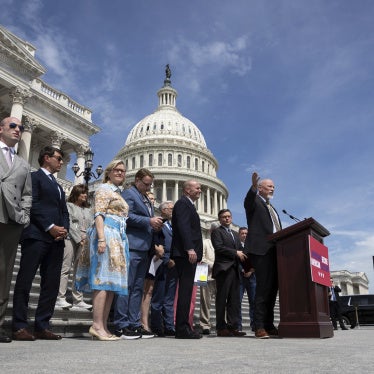Mexico's July 2 presidential elections may prove to be the cleanest in that country's history. But though Mexico has made important strides toward electoral fairness, it's important to realize that the country's human-rights record is not keeping pace. Without the institutions to support a solid democracy, especially a trustworthy justice system, Mexico's vaunted political transformation will fail to deliver on its promise of a better future.
The sorry state of human rights in Mexico is no secret. Mexican and international human-rights groups routinely chronicle Mexico's serious human-rights shortcomings, as do the United Nations and Organization of American States. The litany of abuses makes for alarming reading: torture, extrajudicial killings, "disappearances," arbitrary arrest, labor-rights violations and more.
Far from offering refuge from abuse, Mexico's courts are part of the problem, as even the U.S. Department of State noted in February: "Corruption, inefficiency and disregard of the law are major problems. The wealthy and the powerful generally benefit from impunity."
The results are disastrous, not only for real or alleged opponents of the government, but for accused criminals, everyday citizens unlucky enough to get swept into the criminal justice system and the large portion of the population particularly vulnerable to abuse, such as indigenous people and children.
Elections alone will not remedy these problems. If all human-rights violations in Mexico resulted from central government dictates, perhaps a change of leadership would suffice to end widespread abuses there.
But they don't. In fact, the decentralized nature of Mexico's political system exacerbates the problem, which goes far beyond the actions of a few bad cops and a few indulgent politicians. Police, soldiers, prosecutors, judges and the politically powerful are able to exercise arbitrary authority--nationally, regionally or locally. Mexico's federal system of government makes this widespread abuse even more difficult to control, with 31 separate state-level political, police and justice systems.
Advances in human rights, therefore, will come about only if all branches of government get involved.
- Mexico's executive should start by commissioning an honest appraisal of the human-rights situation, including a review of how and why official human-rights initiatives have not met their goals.
- The Mexican Congress should review legal codes and precedent to effectively prohibit the use in court of evidence obtained through human-rights violations, including torture.
- Judicial officials should overhaul the system of public defenders so defendants have an effective voice with which to denounce abuse.
While the government has taken steps to address human-rights violations in recent years, its efforts have been too timid at best, and some of its policies have been just plain counterproductive.
Unfortunately, Francisco Labastida, the candidate of the ruling Institutional Revolutionary Party, has not only failed to promote a human-rights agenda he has spoken out against basic rights. In an effort to court the get-tough-on-crime vote he said on the campaign trail last month, "Let it be known that the law was made to protect the human rights of citizens, not criminals." And why not? A similar slogan worked last year for a successful PRI gubernatorial candidate. Such verbal swipes are taking place throughout the country.
For his part, opposition candidate Vicente Fox, from the National Action Party, has not made human-rights improvements a campaign theme. However, he recently released an interesting reform proposal suggesting major structural changes to the justice system. For those proposed changes to be effective, though, Fox would have to pay a lot more attention to human-rights issues as president than he has as a candidate.
U.S. policymakers should realize that human-rights problems undercut Mexican economic development and counter-narcotics efforts, among the chief policy goals of the United States. However, the government deserves credit for allowing the Federal Electoral Institute, an autonomous government agency, to oversee federal elections free from the influence of party officials. Substantive problems with the elections may yet surface, like how the IFE handles the hard-to-watch rural vote, and the way that authorities manage accusations of fraud if the election results hang in the balance. Nonetheless, the advances to date have been real.
Free and fair elections without an improvement in human rights sells democracy short. The sclerotic Mexican political system has seemed so immutable for so long, all positive change is welcome. But Mexico can win the battle for clean elections and still lose the war for human rights.








